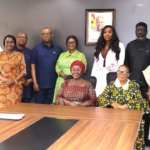
The death of highlife legend Charles Kwadwo Fosu, better known as Daddy Lumba, has triggered a profound national discussion that is much more than a debate over funeral rites. It is a moment of cultural introspection for Ghana, forcing the nation to confront how it honors its non-political heroes. This discussion, garnering attention from the diaspora and beyond, pits an artist’s monumental impact against the precedents of national protocol. The central question is no longer “should he get one?” but rather, “what does this moment reveal about Ghana’s values?”
The call for a state burial by former Vice President Dr. Mahamudu Bawumia is a powerful gesture that brings this conversation to the forefront, challenging Ghana to define a new precedent. This debate is unfolding against the rich tapestry of Highlife music, a genre that is a cornerstone of Ghana’s cultural identity, fusing traditional rhythms with Western melodies like jazz and brass band music. Lumba’s passing is seen by many not just as the end of an era, but as a deeply personal loss for a nation he helped define.
The Case for a State Funeral
Daddy Lumba was a national treasure whose influence extended far beyond Ghana’s borders. His career, spanning over four decades, produced more than 30 albums and an estimated 200 songs. This sheer volume and consistency are virtually unmatched in African music history.
Lumba’s music was the soundtrack of Ghanaian life, tackling themes of love, spirituality, and social justice with a lyrical genius that earned him the title of “musical chameleon” and “lyrical prophet.” His songs, sung almost entirely in Twi, resonated with Ghanaians and the diaspora alike, creating a powerful cultural bridge.
His international recognition was recently cemented when his song “Mpempem Do Me” was featured on King Charles III’s official Commonwealth Day playlist on Apple Music. This royal nod places him in an exclusive club alongside global superstars like Beyoncé and Bob Marley, underscoring his status as a global musical icon.
The outpouring of grief from Ghana’s political and artistic elite is telling. President John Mahama described his “unmatched musical genius” as providing “the soundtrack to our lives.” Former President Nana Akufo-Addo hailed him as “a pantheon among musical greats of all time.”
The widespread mourning led to a headline by the British Broadcasting Corporation (BBC) that quoted a prominent figure, calling him “the greatest from Ghana in the last 100 years.” A state burial would formally acknowledge this undeniable legacy, sending a strong message that cultural contributions are on par with political or military service. It would immortalise Lumba’s name and contributions for future generations, ensuring his legacy echoes not just in music, but in the national consciousness.
The Question of Equity
The call for a state burial, however, is met with a strong argument for fairness and precedent. Critics point to other highlife legends who passed without such an honour. Icons like Nana Ampadu and Jewel Ackah, both pillars of the highlife genre, received state-assisted funerals, a key distinction from a full state burial.
State-assisted funerals often involve some government support for the family but lack the full pomp, ceremony, and official protocol of a state funeral. If Daddy Lumba is accorded a state burial, it would be a retroactive judgment on the legacies of these other artists, suggesting their contributions were somehow less significant.
This disparity shines a light on Ghana’s lack of a clear, publicly-defined policy for national honors. The decision-making process appears fluid and can be influenced by public sentiment, political connections, and the timing of an artist’s death. Lumba’s supporters point to his close ties with the New Patriotic Party (NPP), particularly his song “Nana Yɛ Winner,” which played a significant role in the party’s presidential campaigns.
While this is not an official reason, the perception of political influence in national honors can undermine their symbolic value. A state burial for Lumba would compel Ghana to establish clear, objective criteria for national honors, ensuring that future decisions are based on merit, not political favor.
Mourning a Friend, a Father, a Mentor
Beyond the political and cultural debate, the human element of Daddy Lumba’s death is what truly resonates. For many, his passing isn’t just the end of an era; it’s a deeply personal loss. The media personality Serwaa Amihere, who was close to the artist, expressed her grief, stating, “I am heartbroken and sad because a friend has passed. RIP to the legend, Daddy Lumba.” The rapper Sarkodie also shared a personal reflection, confessing on social media that he hadn’t been himself since the news broke. “Only if I had the words to express how I’ve been feeling since early this morning, but I don’t,” he wrote.
Lumba’s ability to connect with people on a personal level was his true genius. He sang about the universal experience of love and heartbreak, the challenges of life, and the importance of faith. His song “Aben Wo Ha” (“It’s Ready Here”) is a perfect example.
While it was a massive commercial success, its lyrics, filled with clever innuendo about love and intimacy, sparked controversy for being daring and provocative at the time. This dual nature—part prophet, part provocateur—is what made him so compelling to Ghanaians. These heartfelt tributes highlight the profound connection he had with his colleagues and the younger generation of artists he mentored and inspired.
Honouring Icons and Academia
Looking at how other nations honour their cultural icons provides a valuable perspective. In the United States, state funerals are strictly reserved for presidents and a select few distinguished public figures. Celebrities and musicians, no matter how beloved, receive grand, public tributes that are largely organised and funded by their families, often with massive public and media support.
The funeral of Michael Jackson, with an estimated 2.5 billion viewers worldwide, was a privately organised spectacle that showcased the depth of his global impact. Similarly, the United Kingdom reserves state funerals for monarchs. Princess Diana’s funeral, while a grand public event with an estimated 1 million attendees, was a ceremonial funeral, not a state one, highlighting a tiered system of honours.
The conversation around honouring cultural icons in academia is also changing globally. Universities in the United States, for example, have begun to offer courses dedicated to the study of musicians and their cultural impact. Institutions like Yale have offered courses on Beyoncé, examining her work as a portal to discuss Black radical tradition, history, and politics.
Similarly, a number of universities, including Harvard and New York University, have introduced classes on Taylor Swift, analysing her songwriting, entrepreneurship, and influence on gender and media. These precedents show that modern artists are now considered worthy subjects of academic study, moving them beyond mere entertainment and into the realm of cultural history.
A Framework for Legacy
These examples offer a model for Ghana. Instead of a blanket “state burial” that may be perceived as unequal, Ghana could create a tiered system. A “National Cultural Honour” could be a new category, a public and state-funded tribute that falls short of a state burial’s strict protocol but still provides a “befitting send-off.”
This would allow the government to honour artists like Lumba with the respect they deserve, without diminishing the legacies of those who came before him. Such a framework could include a state-sponsored tribute concert, a posthumous national award, or a government-funded foundation in his name to support emerging artists.
The clamour from fans for a permanent tribute is more than just an emotional outpouring—it is a powerful call to action for Ghana’s cultural institutions. A “Daddy Lumba Museum of Highlife Music” would not only serve as a repository for his life’s work but would also tell the broader story of how Highlife shaped Ghanaian identity.
As cultural critic Kwame Sarpong argues, “Lumba’s music isn’t just about him; it’s about us. His story is Ghana’s story. A museum would validate that.” In education, an initiative to develop a new curriculum for music students could solidify his legacy. By focusing on his compositional techniques and lyrical storytelling, this would not only honour Lumba but also provide a new generation of musicians with a deep understanding of Ghana’s musical heritage, much like the academic courses being offered for global superstars today.
The final decision on Daddy Lumba’s funeral is a test of Ghana’s commitment to the arts. It will define how the nation values its artists and whether it is ready to establish a clear, fair, and lasting framework for honouring its cultural heroes.
This is a chance for Ghana to not only mourn a legend but to strengthen its cultural identity for generations to come. The verdict will resonate at home and abroad, defining Ghana’s cultural reputation on the global stage.
- President Commissions 36.5 Million Dollars Hospital In The Tain District
- You Will Not Go Free For Killing An Hard Working MP – Akufo-Addo To MP’s Killer
- I Will Lead You To Victory – Ato Forson Assures NDC Supporters
Visit Our Social Media for More




